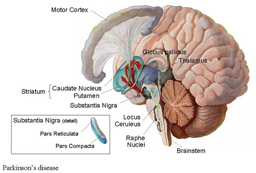Parkinson's Disease

Parkinson's disease is a disorder that affects nerve cells, or neurons, in a part of the brain that controls muscle movement. Parkinson's disease most often develops after age 50. It is one of the most common nervous system disorders of the elderly. Nerve cells use a brain chemical called dopamine to help control muscle movement. Parkinson's disease occurs when the nerve cells in the brain that make dopamine are slowly destroyed. Without dopamine, the nerve cells in that part of the brain cannot properly send messages. This leads to the loss of muscle function.
Symptoms of Parkinson's disease may include
- Trembling of hands, arms, legs, jaw and face
- Stiffness of the arms, legs and trunk
- Slowness of movement
- Poor balance and coordination
Treatment
Medications control symptoms, mostly by increasing the levels of dopamine in the brain. When the effects of the medication wears off, the symptoms can return. Many medications can cause severe side effects, including hallucinations, nausea, vomiting, diarrhea, and delirium.
Medications used to treat movement-related symptoms of Parkinson's disease include:
- Levodopa, Sinemet, levodopa and carbidopa
- Pramipexole, ropinirole, bromocriptine
- Selegiline, rasagiline
- Amantadine or anticholinergic medications to reduce early or mild tremors
- Entacapone
 Alzheimer's Disease
Alzheimer's Disease